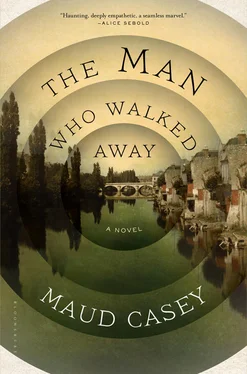Maud Casey
The Man Who Walked Away
I travel not to go anywhere but to go. The great affair is to move; to feel the needs and hitches of our life more nearly; to come down off this feather-bed of civilization, and to find the globe granite underfoot and strewn with cutting flint.
Robert Louis Stevenson, Travels with a Donkey in the Cévennes
It all began one morning when we noticed a young man. . crying in his bed in Dr. Pitre’s ward. He had just come from a long journey on foot and was exhausted, but that was not the cause of his tears. He wept because he could not prevent himself from departing on a trip when the need took him; he deserted family, work, and daily life to walk as fast as he could, straight ahead, sometimes doing 70 kilometers a day on foot, until in the end he would be arrested for vagrancy and thrown in prison.
Dr. Philippe Tissié, Les Aliénés Voyageurs (1887)
It was as though he had always been there, haunting the landscape, if only you were paying attention.
“If it were possible to see the final movement of Beethoven’s string quartet Number 16 in F major. That’s what he was like,” said the violinist from the Leipzig Orchestra. The man he saw walking along the Weisse Elster River reminded him of the note Beethoven wrote on the score underneath those eerie opening chords: Muss es sein? Muss es sein? And the note he wrote under the joyous faster chords swelling in response: Es muss sein! The walking man was the question and the answer. Must it be? Must it be? It must be!
It wasn’t unusual to see a man out walking; even as the railways spiderwebbed their way across Europe, people still walked to get somewhere and to get nowhere. But the people who claimed to have seen him — this was later, after he became known as le voyageur de Docteur , after he disappeared altogether — agreed there was something different about this man. Everyone who saw him said so. “Oh, yes, I’ve seen him ,” said the woman in the lowlands who spotted him making his way along a ridge as she hung wash out to dry for her brothers away carving Tournai stone into baptismal fonts. The coal miner in Liège, blinking into daylight, saw him walking in the valley; the baker in Coblenz saw him cross two of that village’s four bridges; the hotel maid in Mulhouse, that Alsatian city of a thousand chimneys, glimpsed him from the window walking through the public square as she snapped a clean sheet across a bed. “Even when he was right there,” she said, “he was somewhere else.” He shimmered, on the cusp of appearing. Or was he disappearing?
It was not surprising that the violinist saw him walking along the banks of the Weisse Elster. The walking man was often spotted near rivers — making his way up and down the hilly streets of Poitiers at the confluence of the Clain and the Boivre; striding through Bayonne at the confluence of the Nive and the Adour; through Valence d’Agen by the Barguelonne; through Maastricht by the Meuse; through Cologne by the Rhine; through Prague by the Vltava.
If anybody had asked, the man, whose name was Albert, would say the song of his body walking was a silky mist. Nobody asked. Il revient , the rivers called to him. He returns. The silky mist was his constant companion as he discovered himself walking, not knowing how he got there, under the soft spring sun, into summer’s glare, through the muted fall, and into the hard chill of winter when the trees are bare.
When Albert walked along the paths to forges; when he walked the tracks to mines and quarries; when he walked the causeways from village to farm to town to city; when he walked along the trails to market for glassmakers and the merchants of salt, flax, hemp, linen, and yarn; when he walked along the administrative highways; when he passed recruits and vagabonds, rag-and-bone merchants and chimney sweeps; when he walked along pilgrimage routes to miraculous fountains or the chapel of a healing saint; when he walked past men shouldering their dead along roads overgrown with tall grass to the cemetery; wherever he walked, he was filled with a wonder so fierce it was as if he were being burned alive from its astonishing beauty. When Albert walked, he was astonished. When he walked, he was the steam engine, powering himself like a great ship. He was the telegraph; he was the phonograph; he cut a swath through the second half of that century of invention and endless possibility. Still faster, he moved faster, faster than time.
An early spring wind skitters across the river and up onto the docks of this port city so shapely and grand it was once called the Port of the Moon, a port whose grandness made it vulnerable to the greed of the triangular trade, African men and women for the sugar of Santo Domingo. The women working the docks pull their doors shut tight. Making its way up the narrow, winding streets that lead to the center of town, the wind blows a woman’s black oilskin hat right off her head. She slips out from underneath the long cape of the man escorting her home from a party, gently setting down a cage that carries a sleeping dove. A group of straggling, school-bound children herded by their mothers laugh as the woman runs after the hat skidding along just out of reach. She laughs too as the wind rushes past, past the children and their mothers, past a group of men on the way to the docks, knocking a casket of wine from a merchant’s cart into the street. The wind rushes past them all.
Past the statue of Diana dragging the fallen stag, past the statue dedicated to the soldiers who died for their country, past the men lucky or unlucky enough not to work the docks as they settle in at the café tables. It pushes open the doors of the cathedral, whipping around the spires, taking a spin around the bell tower, where it becomes trapped, shivering the bell from the inside out. Muted ringing echoes through the city.
Then it breaks free, blowing through the public square outside the Palace of Justice, past the small stone church where the witchy-looking woman stands guard to harangue anyone who will listen and those who won’t on the subjects of good and evil. “Do any of you know the difference?” she asks. “Do you?” She does. The wind blows past her too, arriving at the large iron gates of the asylum.
Across from the small stone church, in the long shadow of the cathedral, the asylum lies at the intersection of the city’s prosperousness and the humble daily striving of its citizens. Long ago, it was a place of refuge for pilgrims en route to the tomb of St. James in Spain; now its red brick façade is infused with the magnificence of a building once dedicated to something divine.
Outside the iron gates the wind still swirls; inside the courtyard the air is still and warm. There is a careful orderliness to the little compound of the asylum — the dining room neatly dividing the women’s wing from the men’s wing and the chapel — resting on this generous slope of land on the edge of the city, its boundaries marked by a stream that flows into the river. From inside the courtyard you can hear an occasional train, and if you were to look out a window on the upper floor you would see the stern, stony statues of the justices sitting on top of the Palace of Justice across the park. You would see the city buzzing with people, scurrying with heartbreaking purposefulness along the thin, winding streets. But there would be no need to look out the window because the asylum is a world unto itself.
The Director, a veteran of the last war (a war we almost won, he likes to point out cheerfully), is responsible for making this world. He is a high-chested man with a ruddy, mottled face who often appears seemingly out of nowhere, particularly impressive for a tall man always carrying a garden tool. He believes in the good effects of nature, music, and physical fitness on the insane. He is a man for whom the ancient Greek origins of the word psychiatry —the medical treatment of the soul — have always rung true and so, a vegetable garden, a piano, and the regimen of daily exercises he conducts in the courtyard every day except for Sunday (and some weeks even on Sunday).
Читать дальше












